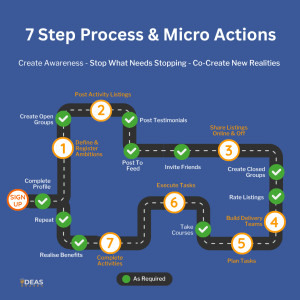When Citizens Must Lead
Vote To Influence Outcomes
You must be logged in to rate.
Activity Details
Reclaiming Agency, Ambition, and Democracy in a Fractured UK
1. The Crisis We Face
For decades, the people of the United Kingdom have watched their society strain under pressures few leaders have truly acknowledged. Housing prices have spiralled beyond reach, wages stagnate, public services buckle under demand, and those who once served the nation - our ex-military veterans -often struggle to survive, some reduced to begging on the streets. Meanwhile, millions of new arrivals have been integrated into the system, some successfully, others in ways that challenge cohesion and strain infrastructure.
The British public has repeatedly voiced its concerns, calling for stricter immigration, economic reform, and accountable governance. Yet governments, regardless of party, have pursued policies that ignore these calls, leaving citizens to live with the consequences of decisions made without their consent.
We now face a societal paradox: citizens are expected to live within systems they neither designed nor endorsed, while their frustration grows, unchecked by mechanisms that actually enable them to influence meaningful change.
2. Historical Context - A Democracy Shifted
To understand the roots of today’s crises, we must examine the historical shifts that reshaped UK governance. During Tony Blair’s tenure, sweeping constitutional reforms redefined the balance of power. The House of Lords lost hereditary authority, judicial independence was restructured, and decision-making increasingly centralised. These changes, framed as modernisation and democratisation, also reduced citizen agency, leaving many with less oversight and influence over how the country is run.
Simultaneously, long-term immigration policies continued apace, often designed to meet labour shortages or demographic objectives. Public sentiment, however, was largely ignored. Even as surveys and local votes expressed opposition to large-scale migration, the political calculus focused on party advantage and strategic demographics. The electorate was neither fully informed nor given the chance to consent to the structural shifts taking place.
Globalist ambitions further compounded this misalignment. Policymakers pursued economic, financial, and political integration with little regard for whether domestic systems were prepared to support these changes. Lessons from initiatives like the Eurozone - where political alignment preceded economic parity - were ignored, creating systemic vulnerabilities.
3. Societal Pressures - The Spiral Effect
The consequences of these choices have cascaded across society. Housing affordability has plummeted as supply lags behind demand, forcing many younger generations and working-class families into precarious living conditions. Low wages in essential sectors have driven native workers away from key jobs, increasing reliance on migrant labour. Public services - schools, hospitals, welfare systems - are stretched thin, struggling to serve both new arrivals and existing citizens.
Ex-military citizens, who have served and protected the country, are left navigating complex welfare systems with limited support. Meanwhile, certain migrant populations, including asylum seekers or those with temporary protections, receive immediate housing, food, and care. The mismatch between need and resource allocation is stark, fuelling social tension, resentment, and the perception that governance prioritises strategy over fairness.
The spiral is clear: structural misalignment → unmet needs → societal strain → frustration → systemic inertia. Each element compounds the next, leaving citizens trapped in a cycle created by decisions over which they had little say.
4. The Limits of Politics and Ideology
Politics is rarely neutral. Ideological bias, strategic demographic targeting, and globalist visions have often outpaced practical economic alignment. Parties act in pursuit of power, using electoral calculus to shape policy rather than respond fully to societal realities. When intent and communication diverge - when citizens are told one thing and policies deliver another - the result is diminished trust, eroded democracy, and citizens left feeling powerless.
This is the environment that breeds frustration. No matter the merit of intention, outcomes matter. Structural pressures - rising housing costs, low wages, overburdened public services, social tension - cannot be alleviated through rhetoric or ideology alone. The system requires citizen agency and collective action to restore balance and ensure outcomes align with societal needs.
5. The People Must Lead
The solution lies not in waiting for political leaders to act but in empowering citizens to take responsibility collectively. Ideas-Shared provides an ambition economy where personal, professional, and societal goals converge. Here, individuals, informal teams, and organisations can:
>>> Share insights and frustrations: voice the issues that matter most, from housing shortages to labour market imbalances.
>>> Coordinate actions: translate individual ambitions into collective impact.
>>> Measure progress: track outcomes at micro and macro levels to see tangible change.
The principle is simple: the problems of society cannot rely solely on politicians. Citizens must reclaim agency, turning frustration into structured, coordinated, and measurable action.
6. Ideas-Shared: The Ambition OS for Change
Ideas-Shared is more than a social platform; it is a practical execution engine for ambition. At its core is the Ambition Directory, a living map of societal challenges, personal goals, and organisational initiatives. Members can zoom out to macro issues to understand systemic pressures and societal trends or zoom in to micro issues to focus on specific problems and actionable solutions.
The platform covers 12 Ambition Areas:
>>> Personal – wellbeing, skill-building, financial stability.
>>> Community – local projects, volunteering, neighbourhood cohesion.
>>> Social – relationships, collaboration, civic engagement.
>>> Cultural – arts, heritage, expression.
>>> Business – entrepreneurship, organisational growth.
>>> Financial – investment, wealth creation, economic literacy.
>>> Environmental – conservation, sustainability, climate action.
>>> Economic – labour markets, infrastructure, productivity.
>>> Political – civic participation, advocacy, accountability.
>>> Scientific – innovation, research, technological advancement.
>>> Spiritual – values, ethics, purpose.
>>> Technological – digital innovation, tools, and platforms.
By connecting these domains, Ideas-Shared enables micro actions that aggregate into macro level change. Personal ambition directly benefits communities; organisational initiatives impact society; societal improvements feed back into professional and personal growth.
7. The Power of Participation
Participation is the heartbeat of Ideas-Shared. The platform encourages double-edged dialogue, where differing perspectives are represented and constructive tension is welcomed. Members influence outcomes through rating, prioritisation, and collaboration, creating a living ecosystem of democratic action.
This is bottom-up democracy in action: decisions are shaped by the collective, measurable, and accountable. Ideas-Shared doesn’t replace government but augments citizen influence, giving the electorate a way to act in alignment with their values and ambitions, regardless of political inaction.
8. Vision for the UK and Beyond
Imagine a UK where citizens drive measurable improvements across personal, organisational, and societal spheres. Where ex-military veterans receive consistent support, housing becomes accessible, and public services align with population needs. Where communities collaborate, micro actions aggregate into systemic change, and citizens regain trust in their own agency.
The model scales globally. Societies everywhere face governance gaps, structural misalignment, and citizen frustration. Ideas-Shared offers a replicable blueprint, where ambitions translate into results - by making others aware, stopping what needs stopping, and co-creating new realities - building bottom-up alignment with societal needs.
This is not theory; it is practical, actionable, and measurable. Personal growth, organisational efficiency, and societal improvement are no longer abstract - they are quantifiable outcomes driven by collective ambition.
9. Join, Share, Act
The time for waiting is over. Citizens, informal teams, and organisations must:
>>> Join: become part of a living ecosystem of ambition.
>>> Share: post ideas, insights, and experiences openly.
>>> Act: translate ambitions into micro actions that aggregate into real change.
Through Ideas-Shared, democracy becomes tangible. Citizens reclaim agency, influence outcomes, and restore alignment between society, governance, and individual aspiration. Every action, no matter how small, contributes to a collective trajectory of progress, proving that together, anything is possible.
In Summary
The UK today reflects decades of decisions made without full citizen consent. Structural pressures, social tension, and systemic misalignment have left individuals, communities, and organisations frustrated and powerless. But there is a way forward: citizen-led action through Ideas-Shared.
By harnessing personal ambition, professional collaboration, and societal responsibility, citizens can act collectively to:
>>> Restore agency and influence.
>>> Align resources, services, and initiatives with real societal needs.
>>> Transform frustration into measurable progress.
This is a new paradigm of bottom-up governance, a practical antidote to political inertia, and a blueprint for global impact. The power to shape the future lies not in distant politicians but in the hands of engaged, ambitious, and united citizens.
The question is no longer whether change is possible - it is whether we are ready to act.



